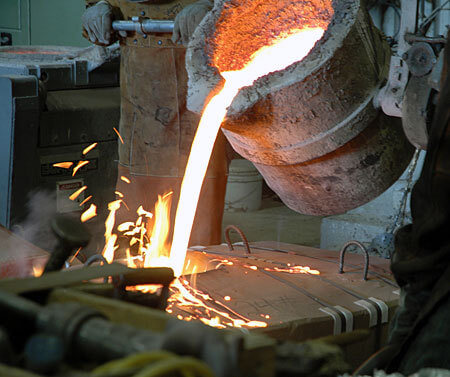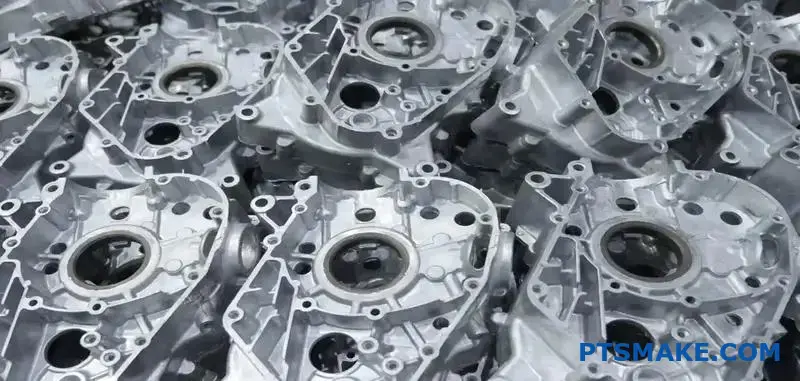Tips for Selecting the Right Aluminum Casting Company for Your Project
Discover the Benefits of Aluminum Casting in Modern Manufacturing
Aluminum casting has actually become a crucial procedure in modern-day manufacturing. Its lightweight yet durable nature offers substantial advantages for different sectors. The capability to achieve detailed designs and preserve tight tolerances contributes to its allure. Precision aluminum casting. Furthermore, the cost-effectiveness and environmental advantages make it a lasting option. As suppliers look for innovative options, the function of aluminum casting remains to progress. What details applications and advantages await expedition in this vibrant area?
Strong yet lightweight: The Benefits of Aluminum
Although many products are used in manufacturing, aluminum sticks out because of its amazing combination of lightweight buildings and extraordinary toughness. This unique quality makes aluminum an ideal selection for numerous applications, specifically in sectors such as automotive, aerospace, and construction. Its reduced density enables less complicated handling and transport, contributing to lowered energy intake throughout production and assembly processes.
In addition, aluminum's strength-to-weight proportion goes over, allowing suppliers to produce durable elements without adding unnecessary mass. This particular is specifically important in fields where weight decrease can result in boosted gas efficiency and general performance. Additionally, aluminum's resistance to corrosion improves the longevity of products, even more solidifying its appeal in modern production.
Eventually, the light-weight yet strong nature of aluminum settings it as a preferred material, fostering development and efficiency throughout numerous fields. Makers increasingly recognize that these benefits can cause significant innovations in style and performance.
Precision and Complexity in Design
As makers welcome the abilities of aluminum casting, they uncover new avenues for precision and complexity in design. This production process enables the creation of intricate forms and comprehensive features that typical approaches typically struggle to attain. The fluidness of molten aluminum allows it to fill up complex mold and mildews, leading to components with tight tolerances and fine surface finishes.
This precision is especially useful in industries such as aerospace and automotive, where exact specs are important for performance and security. Aluminum casting additionally fits ingenious styles that improve capability without compromising architectural honesty.

Cost-Effectiveness and Effectiveness
Cost-effectiveness and effectiveness are vital considerations for manufacturers discovering aluminum casting as a production technique. Aluminum casting offers substantial price benefits as a result of its reduced material costs contrasted to various other metals (Precision aluminum casting). The light-weight nature of aluminum decreases shipping and handling costs, and its excellent thermal conductivity permits quicker cooling times throughout the casting procedure, boosting total production speed
Moreover, aluminum's adaptability allows suppliers to produce complicated forms and designs, minimizing the requirement for extra machining or setting up. This streamlining of production not just minimizes labor costs but also shortens lead times, allowing firms to respond swiftly to market demands.
The durability and deterioration resistance of aluminum spreadings add to longer product lifespans, minimizing substitute expenses over time. As a result, manufacturers can achieve a balance of premium outcome and lowered operational expenditures, making aluminum casting a significantly attractive alternative in modern-day production.
Ecological Sustainability of Aluminum Casting
Aluminum casting stands apart as an eco sustainable manufacturing option, particularly due to its recyclability and decreased ecological impact. The process enables for the reliable use aluminum, a product that can be recycled forever without losing its buildings. This characteristic substantially decreases the demand for virgin aluminum, thus conserving natural resources and decreasing energy intake related to extraction and processing.

Applications Across Industries: From Automotive to Aerospace
While varied industries remain to look for ingenious materials for manufacturing, aluminum casting has actually verified to be a flexible option across industries such as automotive and aerospace. In the automobile sector, aluminum spreadings contribute to lightweight automobile styles, boosting fuel efficiency and performance. Components like engine blocks, transmission housings, and wheels gain from aluminum's strength-to-weight proportion.
In a similar way, in aerospace, aluminum casting plays a significant role in creating intricate parts that need high resilience and reduced weight. Aircraft components such as braces, touchdown gear, and architectural frameworks make use of aluminum for peak performance and safety and security.
In addition, the adaptability of aluminum casting enables it to deal with other industries, consisting of consumer electronics, aquatic, and commercial machinery. This flexibility not only fulfills the specific requirements of various applications yet more info also supports continuous technology in producing processes. As a result, aluminum casting remains a principal in modern production across numerous sectors.
Often Asked Concerns
Exactly How Does Aluminum Casting Compare to Various Other Metal Casting Processes?
Aluminum casting offers superior strength-to-weight ratios, faster cooling prices, and superb rust resistance compared to other metal casting processes. These advantages make it excellent for different applications, enhancing efficiency and performance in manufacturing.
What Are the Regular Lead Times for Aluminum Casting Projects?
Typical lead times for aluminum casting tasks vary from 2 to eight weeks, relying on elements such as complexity, order dimension, and manufacturing capacity. Effective planning can assist lessen hold-ups and enhance job timelines.
Can Aluminum Casting Be Used for Intricate Styles?
Aluminum casting can indeed accommodate detailed layouts. Aluminum Casting Company. Its fluidness enables in-depth patterns and shapes, making it suitable for complicated components in numerous markets. This convenience improves style liberty while maintaining architectural honesty and performance
What Post-Processing Options Are Offered After Aluminum Casting?
Post-processing alternatives for aluminum casting consist of machining, polishing, surface therapies, anodizing, and welding. These techniques improve the surface, enhance dimensional precision, and rise rust resistance, therefore maximizing the end product's performance and visual appeal.
How Do Temperature Level Modifications Influence Aluminum Casting Top Quality?
Temperature adjustments substantially effect aluminum casting quality by influencing fluidity, solidification rates, and potential problems. Quick cooling can result in boosted brittleness, while too much warm might create warping or incomplete filling of mold and mildews during casting.
Aluminum casting has emerged as a critical process in modern-day production. As suppliers accept the capabilities of aluminum casting, they discover new avenues for precision and complexity in layout. Aluminum casting processes typically generate less greenhouse gas discharges compared to other metal casting methods. While diverse markets continue to seek ingenious materials for production, aluminum casting has verified to be a flexible service throughout industries such as auto and aerospace. In the vehicle market, aluminum spreadings add to lightweight vehicle designs, enhancing fuel effectiveness and performance.